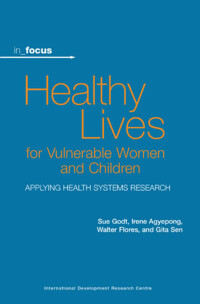Development studies
-
Vermicomposting: A promising technology to turn kitchen waste to organic compost
Vermicomposting is a process of composting that uses earthworm to convert organic waste into humus-like high-quality compost.This technique of converting organic waste into compost manure not only boosts organic production but also helps to effectively manage the household and urban organic waste.
-
From south-south comparative research to policy impact
The Evidence and Lessons from Latin America (ELLA) programme promotes evidence-informed policymaking, by facilitating South-South research, exchange and learning on economic, social, governance and environmental issues.
-
Compressed Stabilised Earth Block (CSEB) Construction Manual
This technical brief explains about the Compressed Stabilised Earth Blocks structure.
-
Healthy Lives for Vulnerable Women and Children
Sue Godt, Irene Agyepong, Walter Flores, Gita Sen
Tremendous challenges remain to ensure that the most vulnerable populations, including women, children, and adolescents, are able to enjoy the healthy lives and well-being promised in the Sustainable Development Goals. Much of their poor health is caused by poverty, gender, lack of education, and so...
-
Le Guide des PMP
Ces dernières années, les partenariats multipartites (PMP) sont devenus populaires pour s’attaquer aux défis complexes que pose le développement durable. Ce guide offre un cadre pratique pour la conception et la facilitation de ces processus collaboratifs qui décloisonnent le monde des affaires, des...
-
Poor People's Energy Outlook 2017
Energy access sits at the heart of sustainable development, enabling progress in health, education and women’s empowerment, among other things. Recognizing this, the global community committed to a dedicated energy access goal in the Sustainable Development Goals for 2030. To achieve this, investmen...
-
Gender, Monitoring, Evaluation and Learning
Caroline Sweetman, Kimberly Bowman
How much have development programmes supported women in their daily lives, and in their struggles for equality and justice? Important though it is for development interventions to be accountable to funders, they are equally responsible to the women and men with whom they work. Monitoring and evaluat...
-
Smallholder Agriculture and Market Participation
Small-scale agriculture is the main livelihood of the majority of the world’s rural poor. Smallholder farmers in the global South play a crucial role in maintaining biodiversity, as well as contributing to food security in their countries. However, they need to be connected to markets to see sustain...
-
Agroecology: Science and Politics
Peter M Rosset, Miguel A Altieri
Our global food system is largely based on unsustainable industrial agricultural practices, is a major source of greenhouse gas emissions, is controlled by a handful of large corporations and produces unhealthy food. Agroecology is a solution to these increasingly urgent problems. After decades of b...
-
Can We Know Better?
This book is intended for all who are committed to human wellbeing and who want to make our world fairer, safer and more fulfilling for everyone, especially those who are ‘last’. It argues that to do better we need to know better. It provides evidence that what we believe we know in international d...










